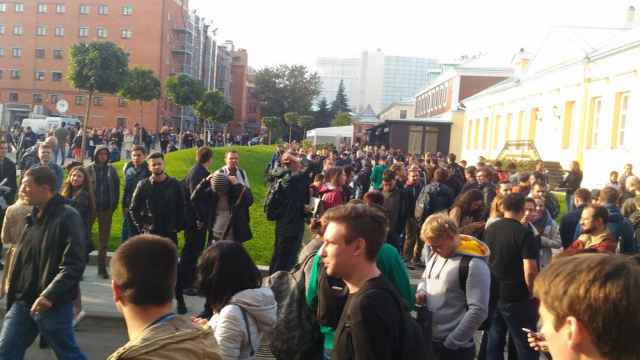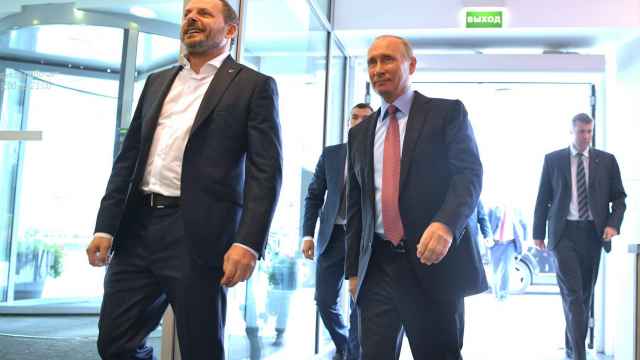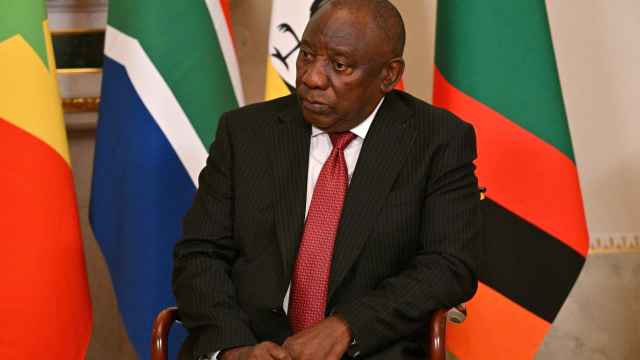Last week, Yandex, the giant search engine and a symbol of Russian tech prowess, celebrated its 20-year anniversary.
Its founder Arkady Volozh played host to Russian president Vladimir Putin, who praised Yandex at its stylish glass headquarters in downtown Moscow.
It wasn’t quite picture perfect.
Bloggers sarcastically pointed out that the Russian leader famously doesn’t use the internet and once described it as the brainchild of the CIA. Kremlinologists saw the visit as a sign that the Russian leader is forming a new image, from someone who poses bare-chested with flexed muscles to someone with an iPhone in hand — a reflection of Russia’s own move from brutish strength to technological advancement.
Columnist Oleg Kashin noted with irony that Putin must have accidentally been handed the list of tricks already used by ex-President Dmitry Medvedev in 2009.
On the surface, Yandex and the Kremlin do represent two different Russias with little overlap. It would be hard to find two more contrasting cultures. As is the norm at other leading tech companies, Yandex staff enjoy a free atmosphere of creativity, informal dress code, open space offices, and hip cafes where employees play video games.
As if to underscore the contrast with the Kremlin, many of those hangout spots were closed off ahead of the president’s visit. Employees were reportedly not allowed to move from their desks for 30 minutes before Putin’s visit on the orders of the Federal Guard Service (FSO). One Yandex programmer wrote on social media that he had been asked to stay home the day of Putin’s visit, supposedly because of his political views.
In contrast to the Soviet-inherited oil giants which existed for decades before Russia’s rebirth, Yandex’s lifespan exceeds Putin’s time in power by just two years.
The company was founded by two mathematicians and close friends: Arkady Volozh and Ilya Segalovich. Volozh worked as CEO of the company (he stepped down in 2014 and became CEO at the Dutch Yandex group) while Segalovich was responsible for coding and tech. Volozh was the business strategist, Segalovich was the company’s beating heart and engine.
The company rapidly grew and soon outperformed domestic competitors like Rambler. At some point Yandex also overtook Google in Russia, becoming one of only a handful of countries to do so. In 2011, Yandex went public and made its founders multimillionaires.
Many emerging millionaires are not fans of Putin’s regime and Segalovich, a liberal, was passionate about Russia’s future. He and some of his Yandex colleagues actively participated in protests against the results of the parliamentary elections in late 2011 and 2012.
He died of cancer in 2013 at the age of 46. Since then, Yandex’s company culture has changed as Russia’s political momentum has gravitated towards conservatism and isolationism.
The government increased its pressure on the free press and online media, and Yandex was no exception.
To protect themselves from a hostile takeover, Yandex’s owners sold a golden share to Sberbank, whose CEO, former minister of economic development and Putin acquaintance German Gref is known as among the most liberal in government circles.
But that didn’t help protect it entirely from the influence of censorship and overall regulatory pressure on free speech. Since 2014, Yandex has had to restrict the results it shows on its news page — the Russian equivalent of Google News — to media which has been registered with the state’s media watchdog.
In recent years, key employees such as Lev Gershenzon, the founder of Yandex News, and Yelena Kolmanovskaya, its first editor-in-chief, left the company. They were followed by head of Yandex News, Tatyana Isayeva, who switched jobs to the opposition-minded Dozhd TV, and then moved to Spain.
Opposition leader Alexei Navalny recently complained that Yandex News hid reports on his recent nationwide anti-corruption protests from its newsfeed. In response, Yandex said its results are automatically generated by algorithms and denied any manipulation was possible.
Loyalty towards the state and its established relationship with the authorities have also brought the company certain benefits.
Yandex recently won an anti-trust war with Google. In Russia, Google is not allowed to pre-install its apps on Android phones, giving Yandex room to develop its products. It could help Yandex keep up its market share, which in the spring of 2017 dropped to 54 percent, a historic low.
But winning this minor battle at home has not been helpful on a global market. Yandex has tried to expand its business in Turkey and Germany, but it has yet to see any significant result.
Despite Yandex’s unprecedented success at home, its price per share on Friday closing was approximately identical to that when Yandex went public in spring 2011. Just to compare: Google’s stock price has tripled since that time and Chinese online retailer Alibaba’s value has doubled.
Without any irony: Yandex is a hi-tech domestic miracle and Russians should feel proud. No lobby could have made Yandex a leading search engine if the product had been poor or fake.
But in today’s Russian reality, Yandex’s capacity for success is very limited. It is a very local and conveniently managed domestic tiger. Something Putin could enjoy playing with.
Elizaveta Osetinskaya is a Russian editor who ran the newspaper Vedomosti, the Russian edition of Forbes and the RBC media holding. She is also the founder of the Bell and is currently a fellow at UC Berkeley.
The views expressed in opinion pieces do not necessarily reflect the position of The Moscow Times.
A Message from The Moscow Times:
Dear readers,
We are facing unprecedented challenges. Russia's Prosecutor General's Office has designated The Moscow Times as an "undesirable" organization, criminalizing our work and putting our staff at risk of prosecution. This follows our earlier unjust labeling as a "foreign agent."
These actions are direct attempts to silence independent journalism in Russia. The authorities claim our work "discredits the decisions of the Russian leadership." We see things differently: we strive to provide accurate, unbiased reporting on Russia.
We, the journalists of The Moscow Times, refuse to be silenced. But to continue our work, we need your help.
Your support, no matter how small, makes a world of difference. If you can, please support us monthly starting from just $2. It's quick to set up, and every contribution makes a significant impact.
By supporting The Moscow Times, you're defending open, independent journalism in the face of repression. Thank you for standing with us.
Remind me later.








